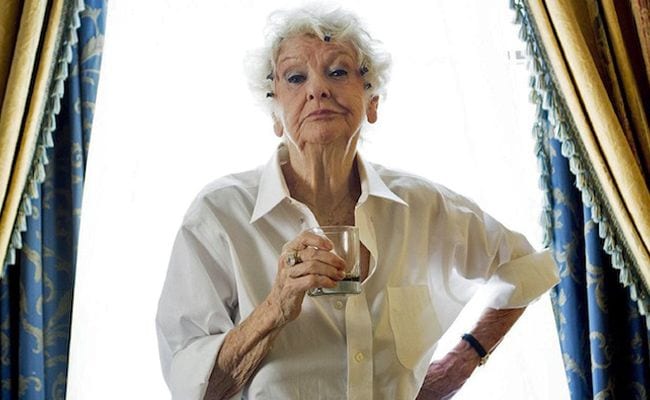
Watching Elaine Stritch: Shoot Me days after she passed away is strange and sad. She is so alive and full of energy in the movie, that you can’t help but think that she was someone who would simply never die—who simply could not die. Directed by Chiemi Karasawa, the film follows Elaine as she prepared for her farewell concert series at The Carlyle Hotel in New York City (where she was also one of their most famous residents), which she called “Elaine Stritch Singing Sondheim…One Song at a Time”. The very fact that she did not choose to call it a “farewell tour”—when even the much younger Cher and Barbra Streisand have had their versions of those—is testament to the kind of life she chose to live.
With those legs that seemed to go on forever, that seductive growl of a voice and her gaze both charming and terrifying (think of a predator about to woo and devour its prey), Stritch became one of the grand dames of American theater, thanks in part to her indelible performances of Stephen Sondheim’s work. Her “Ladies Who Lunch”, perhaps her signature song, is such a powerful moment that many bars in New York City served “another vodka stinger” the day she passed away. With her strength, you half expected Elaine to show up and order one herself.
In the film, she tells how she became an alcoholic; however, as she aged (she doesn’t believe in “being old”, she explains, but “being older”) she decided that she would treat herself to one drink a day. Alcoholism is no light matter, but it is a joy to watch her order a Cosmopolitan when she’s having lunch with her friends. The look of childlike excitement on her face as the waiter sets down the pink concoction is almost too brutally honest. Despite her deep love for performance, it seems that this was her greatest virtue: honesty.
We see a clip at the Emmys where she won an award for her variety special Elaine Stritch at Liberty. One of the first things she does is apologize for drinking too much. As her speech goes on, it seems as if she simply can’t stop oversharing. This made her instantly lovable, as well as a fascinating example of a performer whose honesty doesn’t seem overly calculated or performance-like. (Jennifer Lawrence seems like an obvious heir to this legacy.) When the film begins, Stritch is 86, and she lets the camera follow her everywhere. We see her attend doctor’s’ appointments, throw a fit over having the wrong denture, and try to charm her way out of a possible traffic ticket (she asked her driver to wait for her in a forbidden spot) all with the lack of self-consciousness of someone unaware that a film crew was capturing everything.
Her lack of vanity is touching, and forces one to wonder if she even existed when there wasn’t an audience around. As a true performer, she became alive when she was given a chance to perform. This does not, however, manifest as an an obnoxious shout of “look at me!”, but rather in a more profound way, which makes us wonder if people who don’t feel this way are even in the right career. Because of her advanced age, she was prone to forget the words in her songs, but instead of turning this into a terrible drama, she encouraged audience participation and we see how people would be thrilled in helping her out.
Watching her tell John Turturro about the first time she had an orgasm for example, his eyes wide as full moons, is remarkable both because of the situation in question and because she makes it sound as if this was the first time she had ever told anyone that story.
How she was able to be both grand and intimate is a mystery, and perhaps what made her so important during the six decades she was active. People who know about her work because of 30 Rock—where she played Alec Baldwin’s mother—will be delighted to hear her call him “Joan Crawford” because of his explosive ways, only to see him seconds later lavishing her with praise. This brutality made her irresistible. In a heartbreaking scene, James Gandolfini laughingly explains how they met and how he knows that if she had been three decades younger at the time of their meeting, they would have had a torrid love affair. “It would have ended badly,” he adds with a mischievous laughter.
Stritch doesn’t even shy away from talking about her own heartbreak. She talks of how much she loved her husband (actor John Bay, who passed away in 1982) and how as hard as she tried, she never loved anyone else after him. You can’t help but wonder how many more stories she had in her, and can’t help but feel sad about the fact that she is no longer here to tell them.
DVD Extras include a trailer, teaser, outtakes and a standard making-of documentary.


![Call for Papers: All Things Reconsidered [MUSIC] May-August 2024](https://www.popmatters.com/wp-content/uploads/2024/04/all-things-reconsidered-call-music-may-2024-720x380.jpg)



